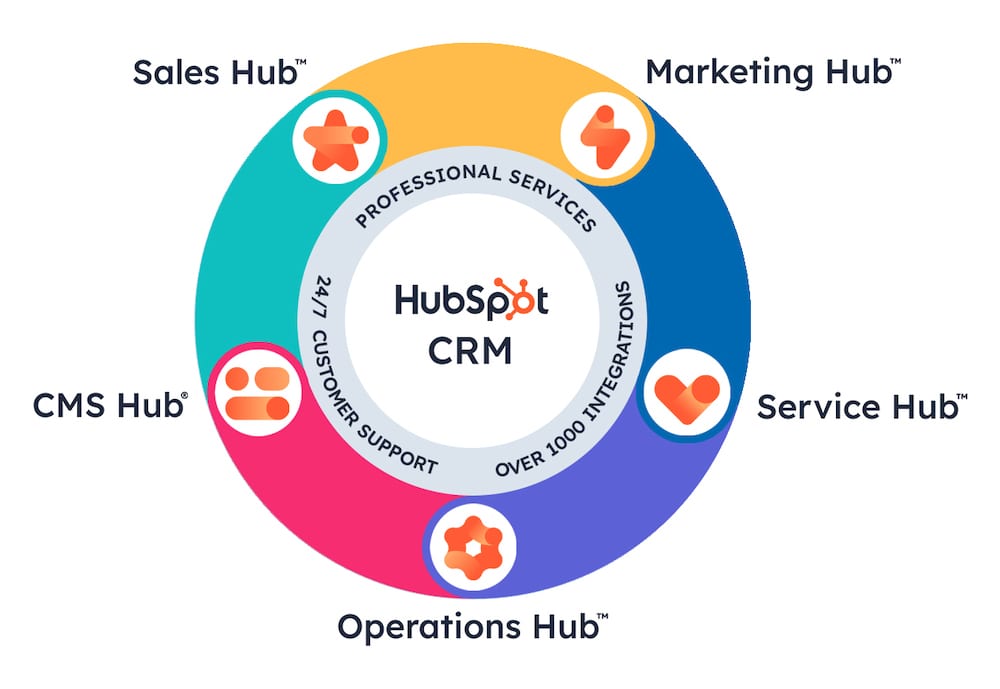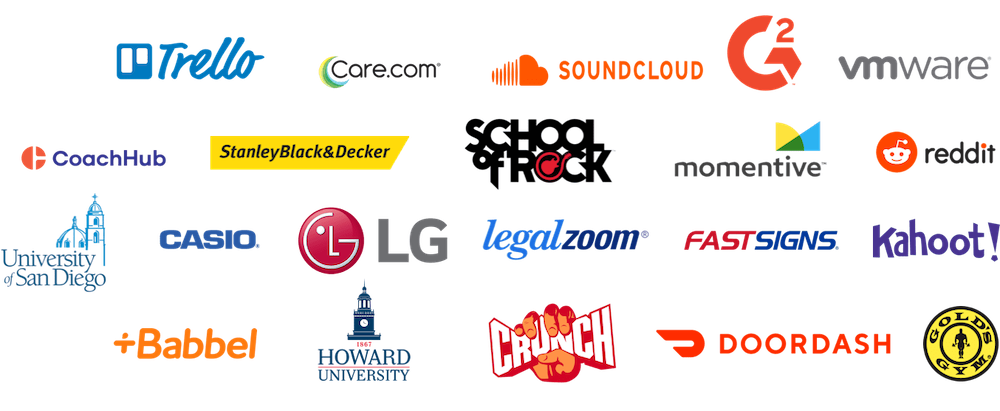Sales teams are struggling to close business
80% of sales managers are not confident in their team’s ability to meet quota
Disconnected tools and data may be holding your team back from meeting customers where they are, and costing your business more than expected.
HubSpot’s connected platform delivers better value, saving your business time, money, and critical resources by uniting data and apps on a connected, commerce-powered CRM Platform.
Let us show you how.
This is due to one of two scenarios:
.png?width=1104&name=Copy%20of%20Linkedin%20-%201104x736%20-%20Horizontal%20Bar%20Graph%20-%20Light%20(2).png)
While point solutions can sometimes offer you specific functionality for a single department, deep functionality for a specific channel, and the ability to quickly meet your one-off needs -- it’s important to think about your technology investment more holistically.
If you don’t, your business may experience unexpected hidden costs, disparate data, and lower adoption. In fact, in a survey of 1,700 software buyers, it was found that more point solutions lead to a higher cost of ownership, primarily driven by increases in personnel costs associated with using multiple tools.
And psychologists have found that switching gears and logging into disparate tools can take up as much as 40% of an employees productive time. And with the average marketer using upwards of 10 tools, that can add up quickly.
.png?width=1104&name=Copy%20of%20Linkedin%20-%201104x736%20-%20Horizontal%20Bar%20Graph%20-%20Light%20(3).png)
The other common approach to front office software is to choose a legacy platform that was built through acquisition of point solutions. While this approach can seem like a better investment for what you get, there’s more than what meets the eyes.
Each app or integration with the legacy platform is built on disparate codebases - making it more complex, time consuming and costly to implement. Disparate UIs lead to lower adoption, significant context-switching, and disconnected data - all with costly development requirements.
In fact, in a survey of 1,700 software buyers, it was found that when your CRM tools are all on one platform, you can have stronger connections among your data and systems, and greater ROI on your tech investments.
Between a global pandemic, hybrid work, an economic downturn, tightening budgets, privacy concerns, rising customer expectations, and the growing complexity of data, it’s no wonder that it’s harder than ever to connect with customers.
Here's how disconnected data can impact your business (and bottom line):
80% of sales managers are not confident in their team’s ability to meet quota
76% of consumers feel they don’t know what companies are doing with their data
24% of b2b buyers cut existing vendors in 2020, with 45% halting projects.
Now more than ever, you’re looking for creative ways to do more with less, cut costs -- all while retaining and growing more happy customers.
We believe HubSpot’s connected platform can help businesses overcome the crisis of disconnection - saving time and money, increasing adoption, and helping you grow better, connected.
-Jul-27-2022-07-25-43-03-PM.png)
Achieve better business results with an all-on-one connected platform that's built on a single codebase. Get better data, and greater ROI.
-Jul-27-2022-07-28-07-32-PM.png)
Save money by avoiding the hidden costs of cobbled point solutions and disconnected platforms, such as costly implementation, employee time lost, and ongoing maintenance and support.
-Jul-27-2022-07-28-25-08-PM.png)
With an easy to use, connected platform, your team gets up and running faster, allowing you to achieve ROI more quickly.

As a connected CRM Platform built on a single code base with integrated hubs for marketing, sales, customer service, website management and operations, HubSpot has everything you need to better serve your customers -- at a better value to your business.
Each HubSpot product is powerful on its own, but the real magic happens when you use them together.
With Marketing Hub, you can save your team the headaches (and cost) of using upwards of 10 disconnected point solutions and build better customer engagements.
With HubSpot Marketing Hub you’ll get a connected app with all the tools your team needs like email, live chat, blog, SEO, chat bots, ads tools, social media tools, automation, and more -- all without the ongoing maintenance costs, and additional training that’s required of disconnected marketing point solutions. Still unsure? Read our marketing hub buyer evaluation guide.
With Sales Hub, you can boost rep adoption, enable them to focus them on the right activities, and drive more revenue by reducing the context-switching cost of disconnected tools.
With HubSpot Sales Hub you’ll get a connected platform with all the tools your team needs like conversation intelligence, forecasting, sequences, calling, eSignatures, meeting scheduling, chatbots, CRM, playbooks, quotes, and more -- without the hidden costs, or wasted time bouncing between disconnected sales tools.
Today, customers expect resolutions in minutes and personalized, 24/7 service through flexible channels. But most customer service reps are overwhelmed trying to meet these growing demands because their tools and data are scattered across multiple disconnected sources.
With HubSpot Service Hub, you’ll get a connected app with all the tools and data your customer service team needs, like help desk automation, knowledge base functionality, customer feedback and custom surveys, customer portal, playbooks, and more -- all powered by a CRM to give your business one unified view of each customer interaction.
Inefficiencies are slowing your marketing, sales, and service teams down, impacting everything from your marketing-to-sales handoff, the productivity per rep, to your customer retention and ability to scale.
By moving both your marketing, sales, and service teams onto HubSpot, you’ll begin realizing even more value by combining the #1 rated marketing automation platform and #1 sales enablement platform to better align marketing and sales around a single shared source of truth.
When you have your marketing, sales, and service teams working on a connected platform, you gain not only efficiency, but also a competitive advantage in how you engage your customers.
Streamline your processes, increase adoption, and drive revenue with a scalable platform that you won’t outgrow. See the benefits of bringing more teams onto a connected platform.
HubSpot is easy to use, easy to train people on, and easy to customize. It empowers people to do what they do best.
I want to attribute increases in revenue directly to specific marketing campaigns, and the HubSpot software is going to help me to do that. Being with HubSpot is like having another member on our team. The support we get is amazing – people who are willing to sit and brainstorm with us, even if our query isn’t directly related to the platform.
Building landing pages was more technical in Salesforce than we could have imagined and beyond the capability of my team at the time. Unlike Salesforce, (with HubSpot) you don’t need to know HTML/CSS to create emails and landing pages. It’s all drag and drop.
The biggest benefit of HubSpot is that all your data lives in it, you see the same customer information as the sales team and vice versa. It gives us a new level of confidence.

customers in over 120 countries are growing their businesses with HubSpot
Below you'll find how HubSpot compares to alternatives when it comes to the total value you get. Browse by Sales and Marketing categories.
HubSpot and Salesforce are consistently rated the top CRM platforms. Both platforms provide large sales teams with a robust solution that can scale with growth. However, the differences start to emerge when you look at how both platforms were built, and how that foundation contributes to cost, ease-of-use, and adoption.
Estimated savings with HubSpot: $100,000+ (source)
Where are these savings coming from? List price, licensing price, Implementation, platform configuration and maintenance, calling and logging, additional engagement tools, call coaching, and support.
HubSpot and Microsoft both offer a host of tools to help run your business, but there are several differences to consider when it comes to hidden costs and the tools you get.
Estimated Savings: $23,000+ (source)
Where are these savings coming from? List price, licensing price, Implementation, platform configuration and maintenance, calling and logging, additional engagement tools, call coaching, and support. (source)
Companies might consider Zoho to be more cost-effective, but the hidden costs of having a leaner product can be a barrier as you grow.
Creating new product integrations after the fact consumes substantial financial and personnel resources, with less predictable performance. It also creates the potential for new security vulnerabilities, since using several data sources puts you at the mercy of several data sources’ security/updating performance.
Agicap switches from Zoho to HubSpot and grows monthly recurring revenue by 8x
GrowSteak increases leads by 5,166% after switching from Zoho
Marketo is a single tool that provides email nurturing and automation and requires costly
integrations or other tools to help with marketing, sales, and customer success.
To get the most out of a single email automation tool, you’ll need deep integration with a CRM (and a commitment to ongoing maintenance from your team).
Beyond email nurturing and automation, your team will need additional tools such as SEO, blogging, video, and more - which come at an added cost and increase in disconnected data.
After switching to HubSpot, ConstructConnect automated flows across 8 brands, drove up to 300% more conversions in various funnels, and is now developing new workflows 99% faster.
LucidPress migrated from Marketo and saves an estimated $77,000 per year with HubSpot.
Mailchimp is a leading marketing automation and email marketing service. It is not a full CRM, so its customers are limited to using its email marketing tools to connect with audiences and drive conversions.
It offers some extra integrations for expanded capabilities, but without a deep integration with a CRM it risks becoming part of a complicated solution stack as business needs grow.
Grove HR had a disconnected tech stack with no central view of their customers. By switching from Mailchimp to HubSpot, they grew their database to 30,000 contacts, with over 50,000 monthly website visitors, and saved their team 70% of their time managing social media by having a better connected platform.
Kinsta struggled with content marketing, sales efforts, and customer service due to a disconnected tech stack that included Intercom, Mailchimp, Calendly, and more. By switching to HubSpot, they increased sales-influenced revenue by $4.5M in two years, increasing average deal size by 50%.
ActiveCampaign offers a variety of features, but it’s not a complete CRM and lacks critical functionality your team requires. Features such as ad management, live chat, meeting scheduling, calling, and more -- will all require additional tools or add-ons. As your business grows or market conditions change, you'll need additional functionality and will be forced to start adding more specialized applications to your tech stack.
This results in a disconnected CRM system, increased costs, and makes it more frustrating to adopt across your team. Instead of cobbling disconnected applications, HubSpot provides you with a connected platform with all the tools your marketing team needs at every stage of your growth.
While both HubSpot’s Marketing Hub and Salesforce’s Marketing Cloud have advanced, enterprise-level features like custom objects and automated flows, social, and email; users rate HubSpot as easier to use (source, source).
Though Salesforce might come with similar features, it still requires an integration sync with other functions such as Salesforce Sales Cloud, introducing more disconnected complexity. And when it comes to cost, Salesforce support can cost customers 30% of their annual contract. Furthermore, Marketing Cloud users require a paid seat on Sales Cloud in order to view sales data, leaving your marketers in the dark.
Find out how HubSpot's connected CRM Platform can help you better connect your systems, teams, and customers -- all while saving you time, money, and valuable resources. Book a demo and our team will walk you through ways to get more value out of your technology investment.